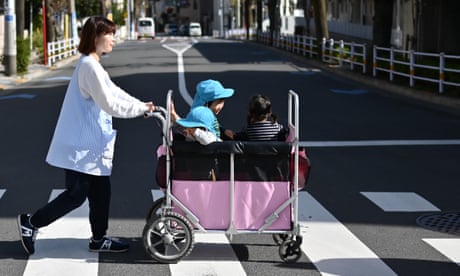- by foxnews
- 08 Apr 2025
Japanese nurseries’ take-home dirty nappy rule perplexes parents
Japanese nurseries’ take-home dirty nappy rule perplexes parents
- by theguardian
- 16 Aug 2022
- in news

Waiting lists for Japanese nurseries are finally falling, but many parents have found that securing one of the coveted places comes at a price - taking home their child's soiled nappies.
A survey has shone a light on the common but rarely discussed practice, with about 40% of towns and cities in Japan saying they demand the guardians of their infant clientele take their used nappies with them.
"I've never told the day care that it bothers me because I don't want to rock the boat. But it's strange," said one mother, who returns from picking up her child with three or four filled nappies in a bag that she throws away as soon as she gets home.
"Why should I take them home?" added the woman, whose two-year-old daughter attends a day care centre in Kyoto, where the city government has had the policy in place since 2011, according to the Mainichi Shimbun newspaper.
Baby Job - an Osaka-based child support company that supplies nappies to public childcare providers - surveyed all 1,461 municipalities that run day care centres and found 39% operated a "takeaway" policy.
The firm placed towns and cities on the list even if just one of the centres they operate make parents return home each day with used nappies.
The poll found 49% had no such requirement, while 11% were unsure or simply responded "other".
The chief "offender" was Shiga prefecture in western Japan, where 89% of nursery facilities asked parents to take their child's nappies home, compared with 17% in Tokyo and 5% in the southern prefecture of Okinawa.
The facilities gave several reasons for making the demand, with most saying it gave parents the opportunity to check their child's health by examining their stools, while a smaller number said they did not have the facilities or budget to dispose of the nappies themselves.
An official in the south-western city of Fukuoka said the practice was a hangover from the days when reusable nappies were more common. "We want the children's guardians to keep track of their health condition, such as the number of times they poo," Yukinori Abe, of the municipal government's children's future bureau, told Mainichi Shimbun.
Yuiko Fujita, a sociology professor at Meiji University, said the policy reflected Japanese society's outdated approach to childcare.
"It is allowed to continue because our society has little awareness of raising children together," she said. "The idea that it's the mother's responsibility to take care of children and their excrement is deeply rooted."
While the number of births in Japan fell to a record low of 810,000 last year, anger among working mothers over the lack of childcare facilities has prompted local governments to dramatically increase places at publicly run day care centres.
The number of children waiting for preschool slots in Tokyo has fallen to about 300, compared with more than 8,500 five years ago, while 80% of towns and cities no longer have a waiting list, according to the welfare ministry.
- by foxnews
- descember 09, 2016
Ancient settlement reveals remains of 1,800-year-old dog, baffling experts: 'Preserved quite well'
Archaeologists have recently unearthed the remarkably well-preserved remains of a dog from ancient Rome, shedding light on the widespread practice of ritual sacrifice in antiquity.
read more


